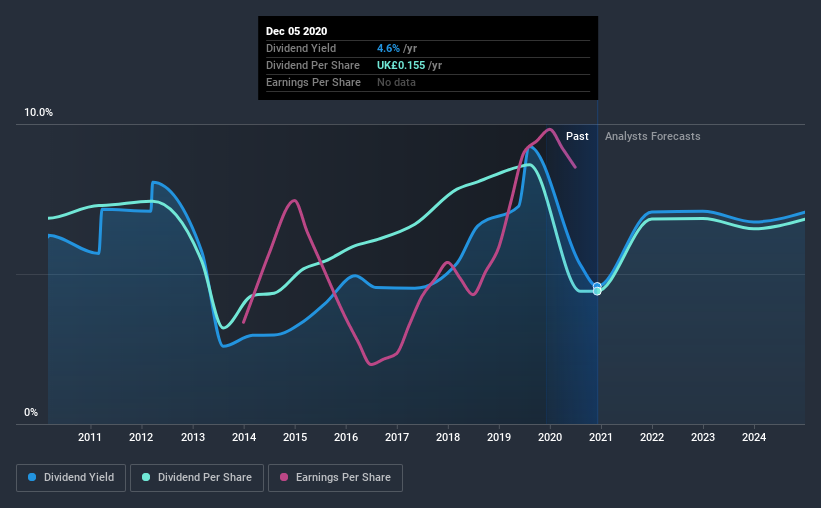- United Kingdom
- /
- Insurance
- /
- LSE:AV.
Aviva plc (LON:AV.) Passed Our Checks, And It's About To Pay A UK£0.07 Dividend

Regular readers will know that we love our dividends at Simply Wall St, which is why it's exciting to see Aviva plc (LON:AV.) is about to trade ex-dividend in the next three days. Ex-dividend means that investors that purchase the stock on or after the 10th of December will not receive this dividend, which will be paid on the 21st of January.
Aviva's next dividend payment will be UK£0.07 per share, and in the last 12 months, the company paid a total of UK£0.15 per share. Based on the last year's worth of payments, Aviva has a trailing yield of 4.6% on the current stock price of £3.382. If you buy this business for its dividend, you should have an idea of whether Aviva's dividend is reliable and sustainable. So we need to check whether the dividend payments are covered, and if earnings are growing.
View our latest analysis for Aviva
Dividends are typically paid from company earnings. If a company pays more in dividends than it earned in profit, then the dividend could be unsustainable. Aviva is paying out just 23% of its profit after tax, which is comfortably low and leaves plenty of breathing room in the case of adverse events.
Generally speaking, the lower a company's payout ratios, the more resilient its dividend usually is.
Click here to see the company's payout ratio, plus analyst estimates of its future dividends.

Have Earnings And Dividends Been Growing?
Businesses with strong growth prospects usually make the best dividend payers, because it's easier to grow dividends when earnings per share are improving. If earnings fall far enough, the company could be forced to cut its dividend. This is why it's a relief to see Aviva earnings per share are up 2.8% per annum over the last five years.
Many investors will assess a company's dividend performance by evaluating how much the dividend payments have changed over time. Aviva has seen its dividend decline 4.3% per annum on average over the past 10 years, which is not great to see. It's unusual to see earnings per share increasing at the same time as dividends per share have been in decline. We'd hope it's because the company is reinvesting heavily in its business, but it could also suggest business is lumpy.
Final Takeaway
Is Aviva worth buying for its dividend? Aviva has seen its earnings per share grow slowly in recent years, and the company reinvests more than half of its profits in the business, which generally bodes well for its future prospects. Overall, Aviva looks like a promising dividend stock in this analysis, and we think it would be worth investigating further.
On that note, you'll want to research what risks Aviva is facing. To help with this, we've discovered 2 warning signs for Aviva that you should be aware of before investing in their shares.
We wouldn't recommend just buying the first dividend stock you see, though. Here's a list of interesting dividend stocks with a greater than 2% yield and an upcoming dividend.
When trading Aviva or any other investment, use the platform considered by many to be the Professional's Gateway to the Worlds Market, Interactive Brokers. You get the lowest-cost* trading on stocks, options, futures, forex, bonds and funds worldwide from a single integrated account. Promoted
If you're looking to trade Aviva, open an account with the lowest-cost platform trusted by professionals, Interactive Brokers.
With clients in over 200 countries and territories, and access to 160 markets, IBKR lets you trade stocks, options, futures, forex, bonds and funds from a single integrated account.
Enjoy no hidden fees, no account minimums, and FX conversion rates as low as 0.03%, far better than what most brokers offer.
Sponsored ContentNew: Manage All Your Stock Portfolios in One Place
We've created the ultimate portfolio companion for stock investors, and it's free.
• Connect an unlimited number of Portfolios and see your total in one currency
• Be alerted to new Warning Signs or Risks via email or mobile
• Track the Fair Value of your stocks
This article by Simply Wall St is general in nature. It does not constitute a recommendation to buy or sell any stock, and does not take account of your objectives, or your financial situation. We aim to bring you long-term focused analysis driven by fundamental data. Note that our analysis may not factor in the latest price-sensitive company announcements or qualitative material. Simply Wall St has no position in any stocks mentioned.
*Interactive Brokers Rated Lowest Cost Broker by StockBrokers.com Annual Online Review 2020
Have feedback on this article? Concerned about the content? Get in touch with us directly. Alternatively, email editorial-team@simplywallst.com.
About LSE:AV.
Aviva
Provides various insurance, retirement, and wealth products in the United Kingdom, Ireland, Canada, and internationally.
Adequate balance sheet average dividend payer.
Similar Companies
Market Insights
Community Narratives



